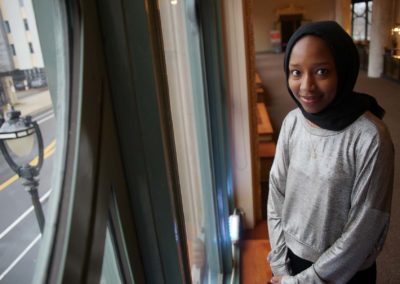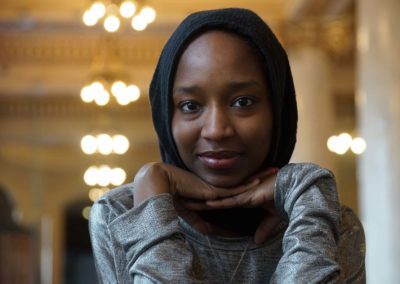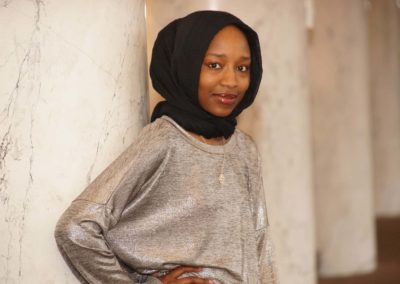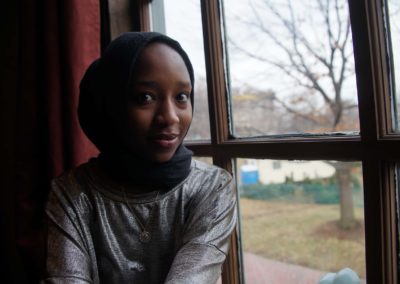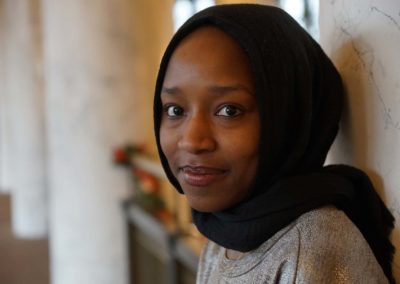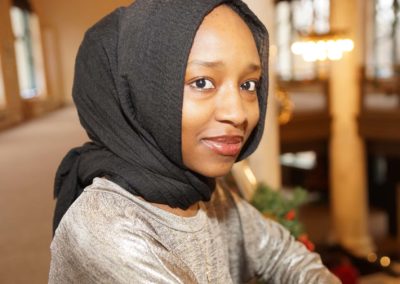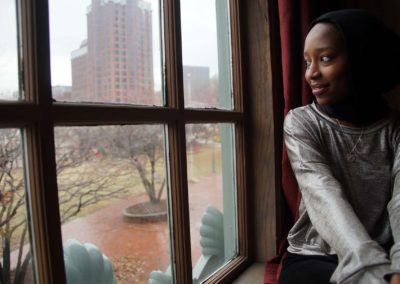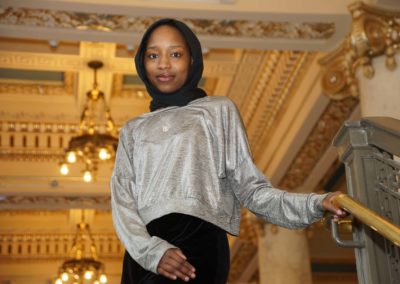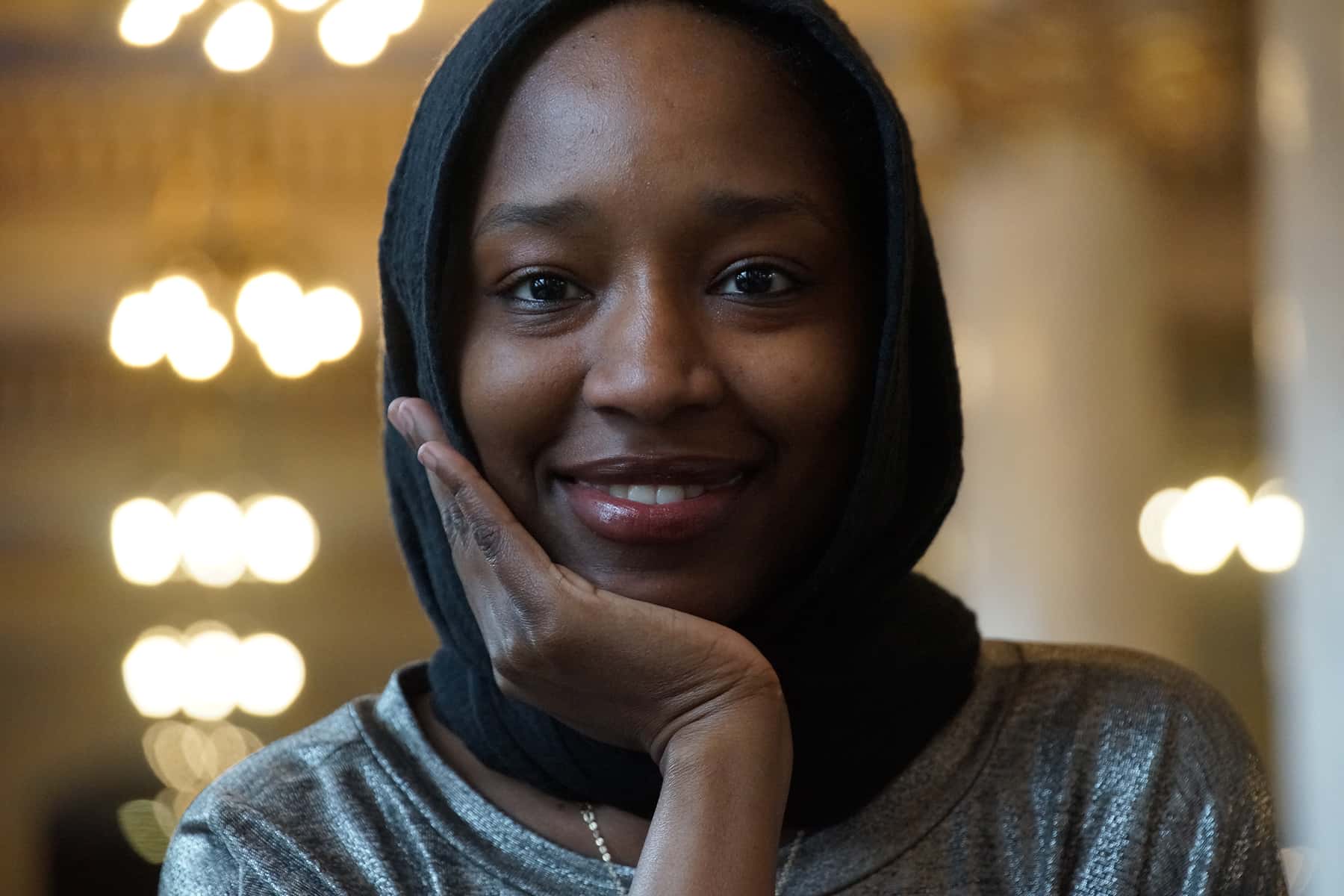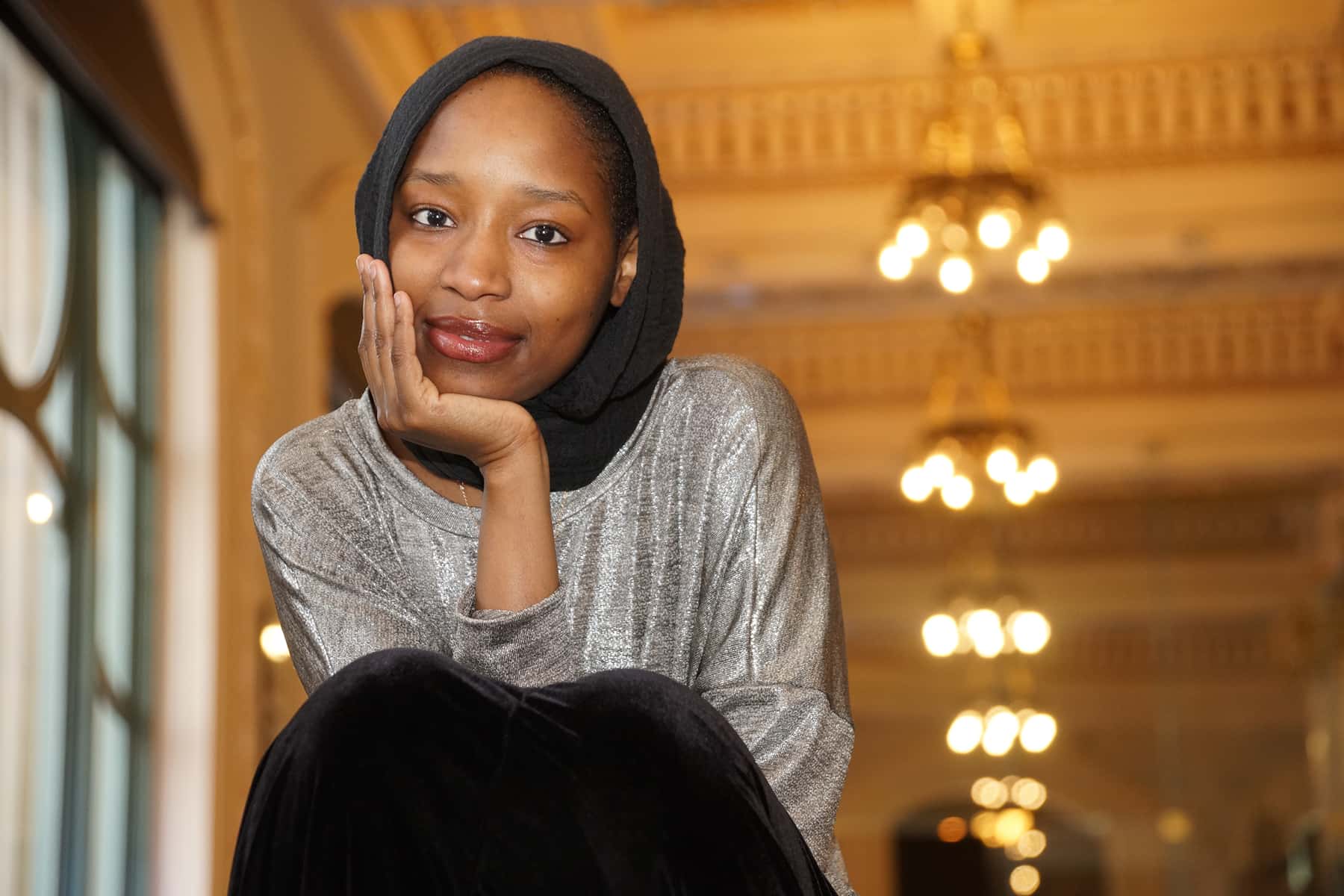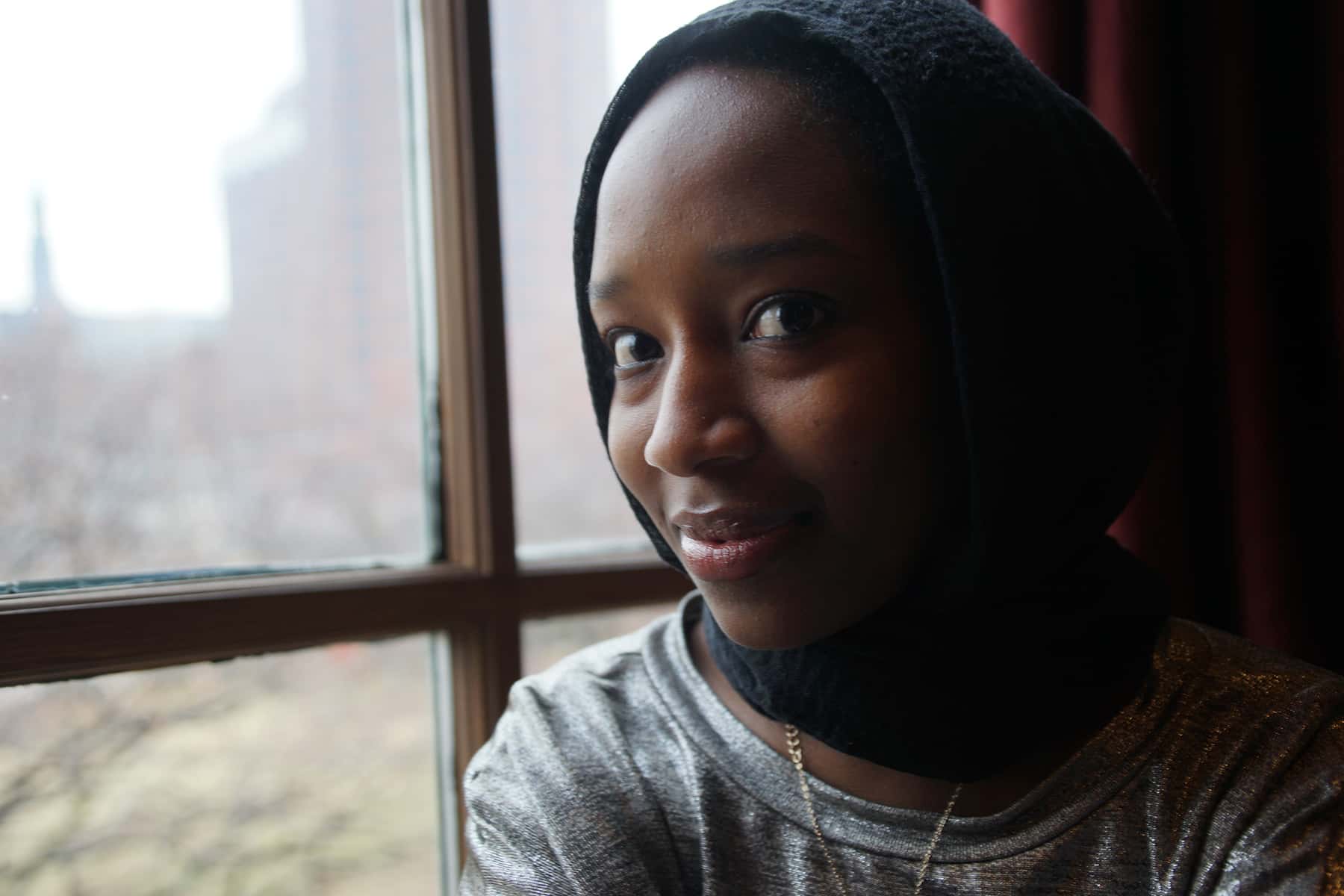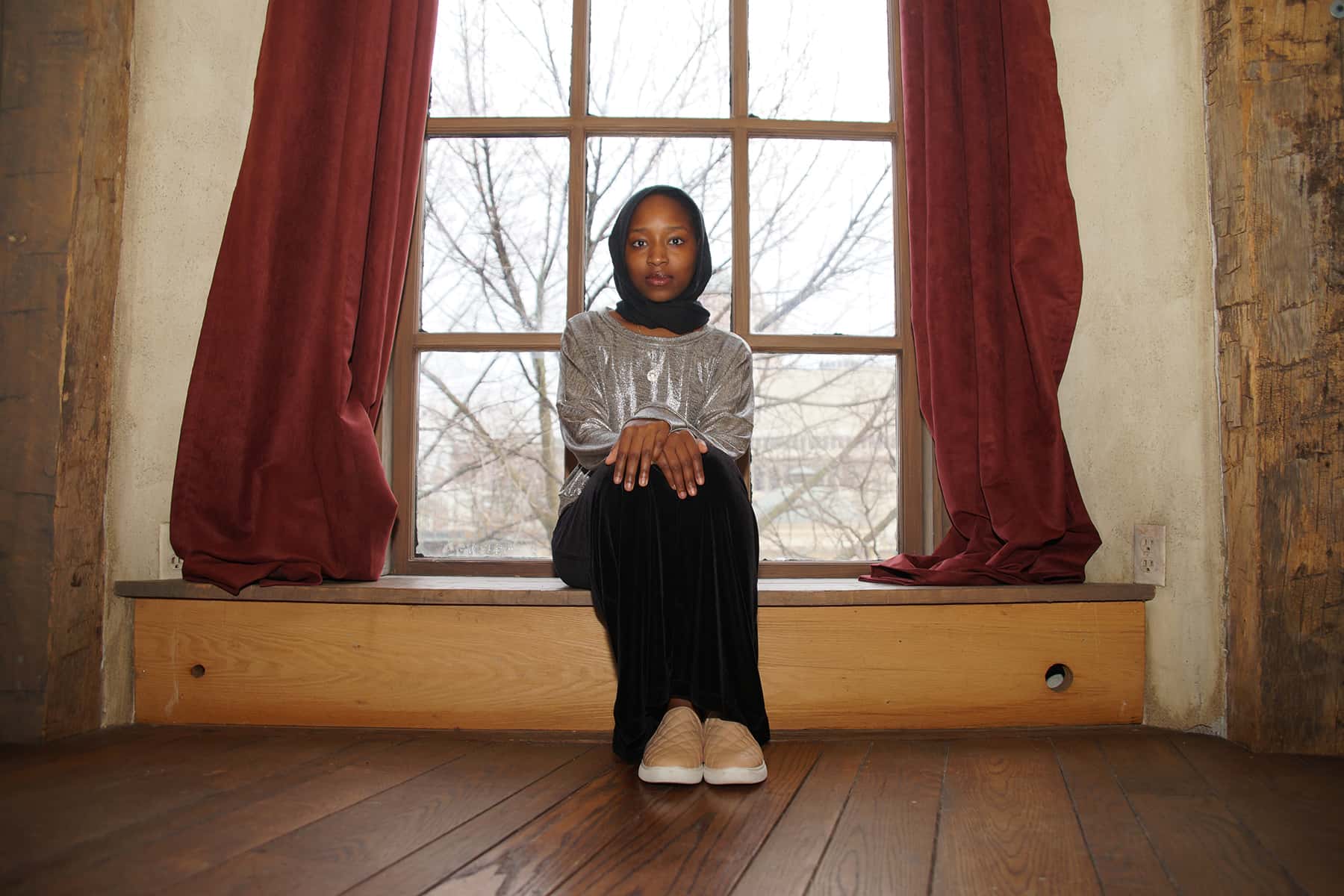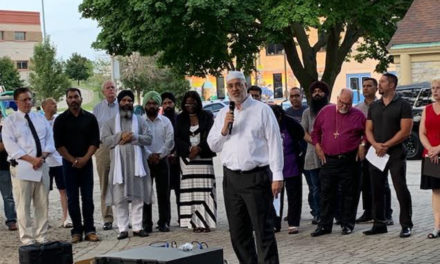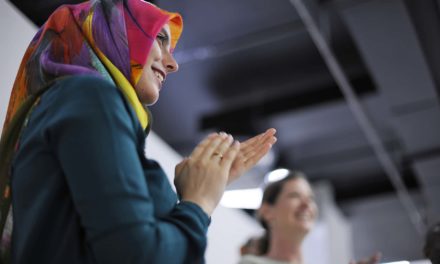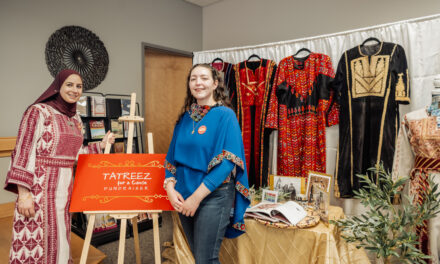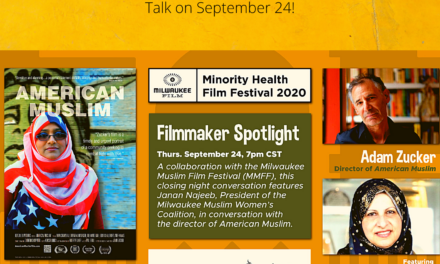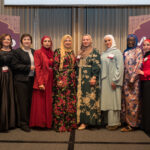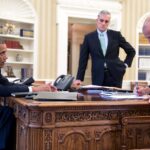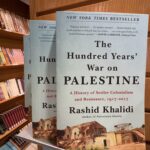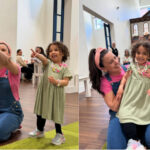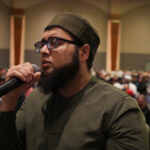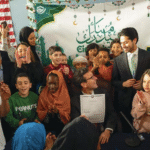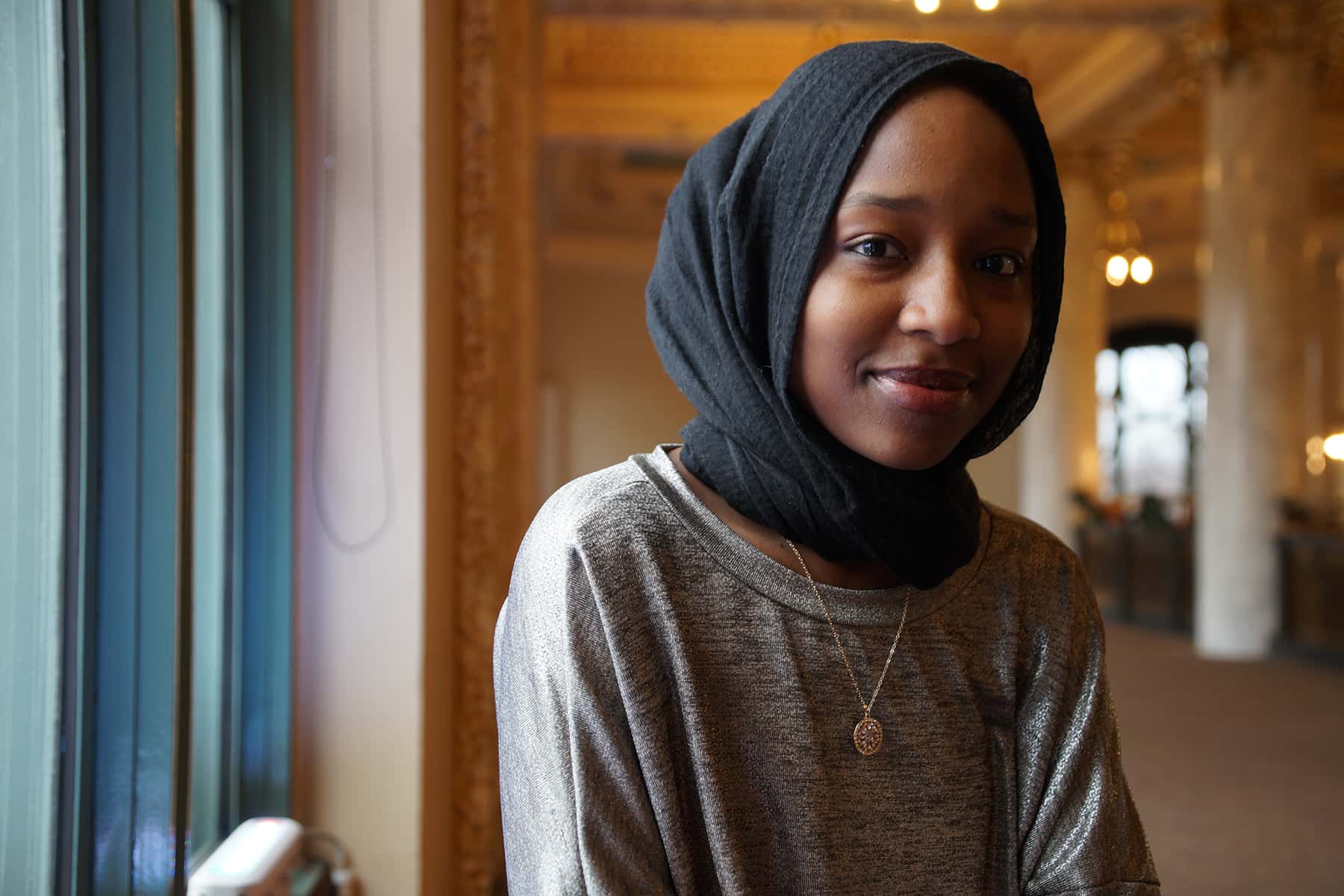
This interview is part of an ongoing editorial series. Each segment highlights a woman in the Wisconsin community. The stories are intended to share personal struggles, public achievements, and the social complexities with their Muslim identity.
As a first generation college student from a Somali family that fled to Kenya during the horrific 1991 civil war, Zeynab Ali sees the term “refugee” to mean being a survivor.
She was a 9th District representative on the City of Milwaukee Youth Council, and a community volunteer involved in human rights issues during high school. Ali has won many awards for her public efforts. She also authored the 2016 book “Cataclysm: Secrets of the Horn of Africa,” which explains the tragedies in Somalia and also serves as a memoir of her family’s life experiences in Africa.
Not only does she struggle with the normal pressures of her age, and being a woman of color in Milwaukee, but Ali manages tremendous responsibilities. Often being a parent to her own parents, who in their poverty never learned to read and write, Ali is a parent to her many younger siblings as well. The resulting contrast in her life has been that for all her public accomplishments, she has had to secretly suffer with many personal issues alone, like depression.
Q&A with Zeynab Ali
Wisconsin Muslim Journal: What do you remember most about your time at the Dagahaley Camp in Kenya?
Zeynab Ali: Growing up in the camp I felt like I had a normal childhood. I was very extroverted. I had many friends and often spent my time outside exploring. That was actually the problem for my parents. I was very curious about everything and would go to places I shouldn’t have. I remember one day my sister and I went over to my aunt’s house which we often did, because my parents were working. I got tired of my paternal aunt’s place since we were always there. I remember my maternal cousin Asha came around that block and when she decided to go home I thought why not follow her. Next thing I knew I was somewhere further from town in the dark. My parents and people all over the camp had a whole search party for my sister and I. After finding me near a dark pit we had to look for my sister Malyun, who’s the second oldest after me. My mom would always advise us to hold hands and stick together and I guess when I left my aunt’s place Malyun went looking for me, resulting in us getting lost. Going missing was typical of me. I also remember almost every week there was always a tornado. I remember my dad being home with my sister and I when they occurred. We had to evacuate our house, so the metal roof of our home didn’t collapse on us and injure anyone.
I also remember that sometimes we would have foreign people visit camp. I knew they were foreign because that was the first time I saw a white person. During those visits all the children in the camp would surround the individuals and follow them around out of curiosity and amazement. I believe they were U.N. or other humanitarian aid workers. I didn’t understand why they came into our land. I was too young to understand why they were so fascinated by us. As a child I didn’t question my life. It seemed normal. I had no idea my parents fled their country, I assumed we were always living in Kenya for centuries because that’s all I knew. The realization that my family was living in poverty came to me as a result of me being barefoot most of the time. I got bit by a scorpion once for that reason. I knew if my parents had realized my feet were burning from the hot soil they would have bought me sandals, but they couldn’t even afford something as small as that. Hence why my mom was gone most of the time. She made money at the market by piercing people’s ears. She didn’t make much from it but it was something. My dad helped sell goods for merchants. He got coins for his work which was only enough to pay for his housing in Nairobi.
Wisconsin Muslim Journal: What does the label “refugee” mean to you, and how did being relocated shape who you are today?
Zeynab Ali: For me the term refugee means survivor, which I personally don’t claim to be. The true survivors are my parents and many others who were able to flee the gruesome persecution and war in Somalia. Currently in our society the term has been used to belittle immigrants as these people taking up a territory that they don’t belong in. However, when I think of the term refugee my brain pictures it as someone who committed a crime and fled the country in order to avoid the consequences. That’s probably how some Americans might interpret it as well. But if we see immigrants as just survivors, I believe people will have sympathy towards them rather than hatred.
My family’s refugee experience has definitely made me resilient and understand situations of people from different backgrounds. It most definitely got me involved in activism, which inspired me to speak up on other issues outside of immigration such as education reform, gun violence, and poverty. I think even if I wasn’t an immigrant I would still speak up about these issues because I have sympathy for others, but because of my immigration story I have a different perspective.
Wisconsin Muslim Journal: When you came to America 15 years ago, what was your biggest challenge in transitioning to a new life?
Zeynab Ali: I had miscommunications with my teachers. I remember in 3rd grade I came to school ill. I was very soft-spoken when it came to talking to Americans because I didn’t know how to approach or talk to them. During class I kept falling asleep and my teacher would call me out every time I fell asleep. We had a system called “flip the strip.” Each student’s name was on the wall with four strips in the colors green, yellow, red, and blue. Green meant you were on your best behavior, yellow was a warning, red meant timeout for ten minutes during recess, and blue meant you had no recess at all. I kept falling asleep during class until I has reached my red slip. I guess my teacher assumed I been up watching television or playing video games the night before which, my parents never allowed us to do. She didn’t know I had a fever and that my head was pounding the entire time and because I didn’t know enough English to tell her, I didn’t say anything. During free time I sat at the timeout bench outside for ten minutes. After my time was up I remained on the bench and took a nap because that’s all my body wanted to do because of the fever. But during the end of the day after my last class I threw up and that’s probably when my teacher realized what was going on all along.
I still faced difficulties after elementary especially throughout high school. I was going through depression, I wanted to run away many times because of the pressure to be in a good academic standing while being the oldest of eight (at the time) and sometimes the parents of my own siblings and parents. Because my parents never learned to read and write, I write out my parent’s bills since I was nine and just dealing with my parents’ post-traumatic stress disorder while keeping up with other home responsibilities contributed to my depression. There were also times I wished I was dead. I didn’t have a social life in or outside of school. Most students assumed I was mean, too serious, judgmental, or a loser. Students couldn’t approach me for that matter. When I tried to interact with other students it was awkward because I didn’t know how to converse with them, but on my end, it was because I lost myself through my sorrows. I still feel like I’m transitioning because there’s still a huge chunk of American culture that I’ve avoided due to the problems I was facing. I’ve gotten better at standing up for myself and talking about my problems. However, I’m still learning to converse with American youth. It’s different when I talk to people in my culture. With American youth I constantly feel like I’m being judged, or I sound stupid but with other Somali Bantu youth I feel like myself because we face the same struggles.
Wisconsin Muslim Journal: Are there any aspects of living in Milwaukee that remind you of Kenya?
Zeynab Ali: Back in Kenya I had so many friends that I couldn’t claim one as my best friend. I felt that I had that similar network in grade school at Clara Mohammed, a predominately Black Muslim school in the city. It was mostly Somali Bantu (my ethnic group) students attending the school. It was like living in the refugee camp again except it was a school. People in my culture still carry the practice of hospitality here in America. We also maintained our culture and customs. The American life did not change those things for us.
Wisconsin Muslim Journal: What inspired you to become a youth activist, and what has been the biggest lesson from the experience?
Zeynab Ali: I think it’s important to understand that you don’t need to have this distinguished title or label in order to be a changemaker, which is why I don’t like to identify as an activist anymore. More so because in high school I was dealing with mental health issues which led me to postpone my proactive agendas. I don’t think it’s right to call yourself an activist if you’re not constantly bringing awareness which I wasn’t. It was during that time when I realized there was no way I could push messages through and help others when I was secretly suffering. Today I focus more on my academic studies and just overall getting to know myself as an individual. I still have issues I deeply care about that I research on my own, I just don’t consider myself an activist. I think it’s hypocritical of me to identify as an activist if I’m not actively engaged in the work. I see myself as a concerned human being, which I believe most people are. I am a firm believer that those who don’t have prominent titles are the real changemakers in the world. Currently, I’m happily making a difference privately without media attention or publicity, that way I’m more focused on the outcome and effectiveness of my work.
Wisconsin Muslim Journal: How did you become a representative on the Milwaukee Youth Council, and what did that position mean to you?
Zeynab Ali: I joined the Milwaukee Youth Council as a sophomore in high school after many attempts. I quickly noticed at the time that the council members were made up of family members of well-known political leaders or family friends of those leaders. I was the only one who had no ties to anyone at City Hall at the time. My last attempt to join the council was successful because of help from Mayor Tom Barrett. I didn’t understand why it was so difficult for me to join at first, especially when there were more than five vacancies for certain districts, but I realized soon enough that it was the privilege of being close to a political leader that got students into the council. My motivation to join the council originally was because I wanted to work with my peers within the City of Milwaukee to resolve issues facing us, but members of the council were students who didn’t have to face circumstances that the average youth in Milwaukee faced. I ended up resigning after the following year because it got too political for me. Politics was something I’ve always tried to avoid. My belief was that if we looked at everything politically, nothing would get done which is what happened in the council. We met every second and last Wednesday of every month just to discuss and vote on issues and not act to implement or resolve anything. The thought of having a title without taking any action bothered me which led to my resignation.
Wisconsin Muslim Journal: What was the biggest obstacle you faced in your activism efforts, and how did you get around it?
Zeynab Ali: Public speaking was my biggest challenge. It was even more difficult during those days because I had no confidence in myself. I always thought my speeches or remarks weren’t as strong and inspirational as I wanted them to be. I was constantly putting myself down. I didn’t realize my lack of confidence was the reason behind it until I recently became more confident in myself. I learned to avoid negative thoughts and to think of positive outcomes as a result of my remarks. At the moment before I go speak I tell myself mentally ,that I can do it and relax my body, and really just think about my words as they come out of my mouth. Previously, I would not even pause to catch my mistakes, which prevents me from stuttering. Another struggle I had.
Wisconsin Muslim Journal: From your observations, what is the biggest misunderstanding Americans have about immigrants who are refugees?
Zeynab Ali: First things first, Americans always assume that we all have an accent. I understand that people didn’t know I was African or an immigrant because I don’t have an accent. From watching the news, so many Americans also assume that we came to the U.S. to steal jobs and commit crimes when in reality we escaped our countries because we were being persecuted and killed by our own people who had power over us. I think it’s important for Americans to know that we wouldn’t have fled our countries if they were civil. No one leaves their country in such manner unless it’s a life or death situation. For many of us, we carry that trauma back in the U.S. People like my family don’t get a break after moving to America. We are constantly worried about our families back home who can’t make it safely out of the country. Our family members who are left to die from starvation or armed attacks. So, coming to America isn’t paradise for us. Obtaining assistance from social welfare offices doesn’t make our life easier either. Parents like mine still can’t afford to pay for their bills even with both parents working. The idea that Americans think the government is spending huge chunks of its funding on lower income families like mine is simply wrong. Government assistance gives us a leg up, but it doesn’t make our life any easier.
Wisconsin Muslim Journal: How has your life changed since graduating high school, and what has the transition to college been like?
Zeynab Ali: I couldn’t wait to start college especially after all I been through in high school. I’m currently a sophomore majoring in marketing. During my first year of college I was not involved in any groups or organizations on campus. Since I am a first-generation student I took that time to try to learn as much as I could about college. Whether it was how to compose a professional resume, or figuring out how to pay for classes, just about everything I felt I needed to know. I didn’t have an older sibling or parents to guide me. I learned the bare minimum from my own mistakes and visiting my advisor every week for the slightest things. I remember the first summer before college I was talking to a friend who asked me if I checked my financial aid package. I didn’t know what she was talking about or where to check for that information. I was lucky she was able to guide me through that information because her older sister had helped her prepare for college. I was close to the due date where I could’ve lost all the money that was offered to me. Unfortunately, I didn’t receive any of the scholarships I applied for but grants from FAFSA helped me pay for college.
Wisconsin Muslim Journal: What does your attending college mean to your family, and their hopes for your future?
Zeynab Ali: For me personally, this means I can finally show my parents that the fear and sacrifices they faced were worth it. It means that one day I’ll be in a good financial state to support my parents and family back home.
Wisconsin Muslim Journal: Considering the position of current refugee policies, what can people in Milwaukee do to assist resettlements in the area and help the existing refugee community adapt to life in America?
Zeynab Ali: It would be great if there were services where social workers are able to work with refugee parents not just the children. People like my parents still can’t read or write after living here for 14 years. This is a big issue because it’s harder for them to find good paying jobs to support their families. The manual labor jobs that are offered to them aren’t enough to pay their bills. Literacy would also help these parents obtain their citizenship tests faster and help their younger children with their homework. When my siblings and I are busy with homework my mom wishes she can help the younger ones with reading and writing, so she’s not constantly asking us to help them when we have homework and projects waiting for us as well. Therefore, literacy is the foundation for everything. A program like this offered by sponsors or social services programs would help these families tremendously.
Wisconsin Muslim Journal: If you could send a message back in time to yourself 15 years ago, or into the future 15 years from now, which version of yourself would you contact and what would you say?
Zeynab Ali: At the moment I feel like I am the best version of myself. I was five years old 15 years ago, so you couldn’t tell me anything because I probably wouldn’t have taken it into consideration, but I would contact myself during second semester of my freshman year of high school when my depression began. I would tell myself that everything will be okay and to trust Allah’s plans and that this is nothing compared to the wonderful blessings coming my way. Because the knowledge I gained from my religion is what truly healed me from my past and gave me hope for the future.
Wisconsin Muslim Journal: What would you say to other young refugees in Milwaukee about their current struggles and future hopes? And what one message would you like the general public to remember?
Zeynab Ali: To young refugees I would say you are what your parents dreamed of. You were given the privilege to live in a more civil society where you can do and achieve anything your heart desires. Make their sacrifices count. Do something that will make your parents say I would sacrifice everything all over again just to live this moment again.
For the general public I would say, meet someone who’s different from you – whether they are from a different culture, race, religion, political party affiliation, and start a conversation with them. You’ll learn that they are just like you. You might pick up something you didn’t know about them. If we practice this in our current day and age, we will progress greatly in society. This would likely ease many tensions in the world too.
